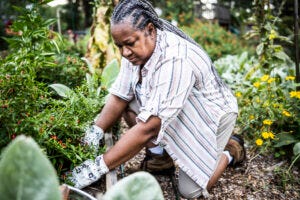Towards a Conservative Environmental Policy
The solution to a dying economy, carbon terrors, food toxicity, Big Ag, Big Pharma predations and Bill Gates' malignancy
You can laugh at Gwyneth Paltrow all you like, but her upper class followers, millions of them, determine the future via their purchasing power. Their focus is their family's health, and they only buy clean food. In that lies an end to the pitched fight over the environment. Chemical free, humanly raised, local, small batch, caring. Marketing 101. Aspiration determines choice. Axiom.
In fact, anyone with sense and a little extra money buys organic food. And farmer/thinkers on both the right and left, see, argue, agitate for, and write about the drawing down of Big Ag, combined with a deliberate, policy-led revitalization of the country. Regenerative farming is a growth industry on both the right and the left, because rural people understand the depletion of the soil, the poisoning of the waters and air. Joel Salatin and Wendell Berry, natural political opponents, both want the same thing, which is to say a revitalizing of farming country and a hardening of property rights, the opposite of current policy on both sides of the fence.
A new book, Small Farm Republic: Why Conservatives Must Embrace Local Agriculture, Reject Climate Alarmism, and Lead an Environmental Revival, argues for the overturning of rapacious Big Agriculture behavior and a re-envisioning of environmental policy on the right. Its author, John Klar, a tax lawyer, ill with one of those mysterious modern conditions, moved to a dairy farm with his wife, and dove in. This book is the result of painstaking analysis, deep reading, and lived experience. Another recent entry is Saying No to a Farm-Free Future, the Case For an Ecological Food System and Against Manufactured Foods. Chris Smaje, a Brit, argues from the left for a nation of small farmers, spread across the land, engaged in deep stewardship of both land, animals and adjacent community. Both believe that the economic prosperity resulting from that would light up a dying economic model.
Klar, as does everyone, ran smack into the regulatory manure-storm federal and state governments have launched against rural people. He took his hard-earned knowledge and ran for the Vermont state senate last year for the Republican Party, following an unsuccessful long-shot bid for the governorship two years earlier, a heroic act. Big Ag receives nearly a trillion dollars a year in subsidy-- globally -- and, courtesy of its lobbyists acts virtually without supervision. Regulations are only for small farmers, actual family farms who are Big Ag’s principal competition. As Klar points out, all the environmental costs are offloaded onto local communities, creek and groundwater polluted with chemicals and shit, air filled with the same chemicals, depleted soil, processing "the earth’s bounty into addictive unhealthy products... peddled to children and a vulnerable stressed out generation of Americans," as Klar says. Monsanto/Bayer's annual revenues are $15 billion, and 21,000 employees are paid an average of $87,000, via "a prolonged infliction of environmental destruction."
Klar argues that food liberty is at the base of all liberty, and in this he is in line with John Dickenson, who in 1768’s Letters from a Pennsylvania Farmer pointed out that the unconstitutionality of British revenue laws were also economic folly. American farmers now labor under laws written by multinationals and the United Nations Food and Agriculture Organization. The goal being all Big Ag, no small farms. This is part of its 2030 Agenda, which sees the rural demographic as the greatest threat to total control, according to Klar.
Instead, Klar proposes distributism, an economic structure whereby those who raise food, control and retain the profits of their labor. “All of society benefits when families tend the soil,” says Klar. Today, any sustained drive into rural America demonstrates the results of a three-generation hidden policy to take people off the land and grab that land, whereby it ends up in the portfolio of hedge funds, as carbon credits. Devastation reigns from coast to coast in ex-urban America. The policy is entirely wrongheaded. It has led to cultural decay, bad human health, creation, says Klar, in reverse.
This bog-stupid plan did not factor in the cultural zeitgeist, the felt need for authenticity, simplicity, and above all, the stopping of the seemingly endless proliferation of toxic chemicals dumped into water, air and earth. And for those made paranoid by climate hysteria, if only 11 percent of the world's cropland improved the community of soil microorganisms, notes Kristin Ohlson in her 2014 book, The Soil Will Save Us: How Scientists, Farmers, and Foodies Are Healing the Soil to Save the Planet, the amount of carbon sequestered would offset all our current emissions of CO2.
By 2020, says Klar, small farming became increasingly profitable and would be more so if taxpayers refused to subsidize Big Ag. As he points out, farms revitalize a community like nothing else. A rancher and farmer said recently on a roundtable with RFK, Jr., that when he shifted to regenerative agriculture, his profits grew so fast that his payroll is now over six figures a month. In fact, the job multiplier of resource industries is larger than that of any other sector. A well managed resource radiates benefits all the way to the city center.
One thing that neither Smaje nor Klar mentions is that in restoring small farms around rural communities lies the solution of one of our most pressing problems, alienation and division. At American Stewards, Margaret and Dan Byfield teach farmers and ranchers how to counter the regulatory onslaught of Big Ag, Big Government, and Big Conservation. Using the Tenth Amendment and something they call “co-ordination,” they show how to assert the equality of the values of rural communities in the face of federal and state government demands. The couple have met tens of thousands of farmers and ranchers across the country and are authorities on the state of play.
Says Margaret today: “I think regenerative farming is not that novel. It is common sense. It is the way small landowners want to manage the land, but are hampered by nonsensical regulations, as you noted. For instance, I know many ranchers who would happily sell their beef directly to the consumers, but years ago, the health and safety regulations shut down the small town butchers. Where before there was a butcher in every small region, now there are only a few independent butchers in a state. Getting the animal processed has become difficult because so many small butchers went out of business unable to comply with all the federal and state regulations. As a result, ranchers are forced to sell their product to big Ag and comply with all their requirements.
“The regenerative farming trend is from my perspective simply circling back to old wisdom and figuring out a way to do this in modern times. It could be a good thing as long as this group does not attack those who have been doing this, or trying to, for generations.
Margaret’s father, Wayne Hage, a storied name, was the founder of the Sagebrush Rebellion, which I think kicked off the entire worldwide populist revolution. He fought for the water rights and grazing rights on his leased lands and then he had to fight on his deeded lands. Harry Reid and the environmental movement were implacable and did not care about the ruination of that family or that ranch. They wanted the water, they wanted the kill, so they could intimidate landowners across the west. Hage had to fight all the way to the Supreme Court. To my mind, every time you support an environmentalist, you are ruing a family. Today, the movement is entirely malignant.
Says Margaret: “When we purchased Pine Creek Ranch in 1978, the first thing dad did was eliminate all the vaccines and hormones used by the previous owners. He believed if you raised the cow properly - give them lots of room to graze - the land will take care of the cow and vice versa. Some cow buyers would refuse to purchase our cattle because they were not vaccinated. That was fine with dad. The reason for vaccinating the cows was to prepare them for the feedlot where they tend to pick up diseases being in a cramped environment. But they didn’t need vaccines when they were on our ranch."
“This could be a good trend if it leads to less regulations and diminished corporate control. That would be a blessing.”
As people move back to the land to find a saner pace of life, they will encounter the regulatory prison and they will have to find a way to fight. Nothing cements community relations faster than fighting for that community. Solving the problem of miserable, atomized, submissive consumers may take nothing more than a plot of land, some chickens and a farm shop by the side of the road.
Welcome to Absurdistan is supported by you, the reader. I charge very little because there are so many great substacks and people to support. We are in the middle of great ferment, the culture shifting beneath our feet, and I think, trending positive. Please support me in my work.







Right on the money. EVERYthing needs to be decentralized; starting with how we obtain our food.
Let Bill, Klaus et al feast on their bugs, with us watching!!!
Excellent message! More and more of humanity is waking up to theses simple truths. Thanks for sharing my book. Food security is ultimately about being human -- both our liberty and health depend on it, and the globalist are coming for our food!....